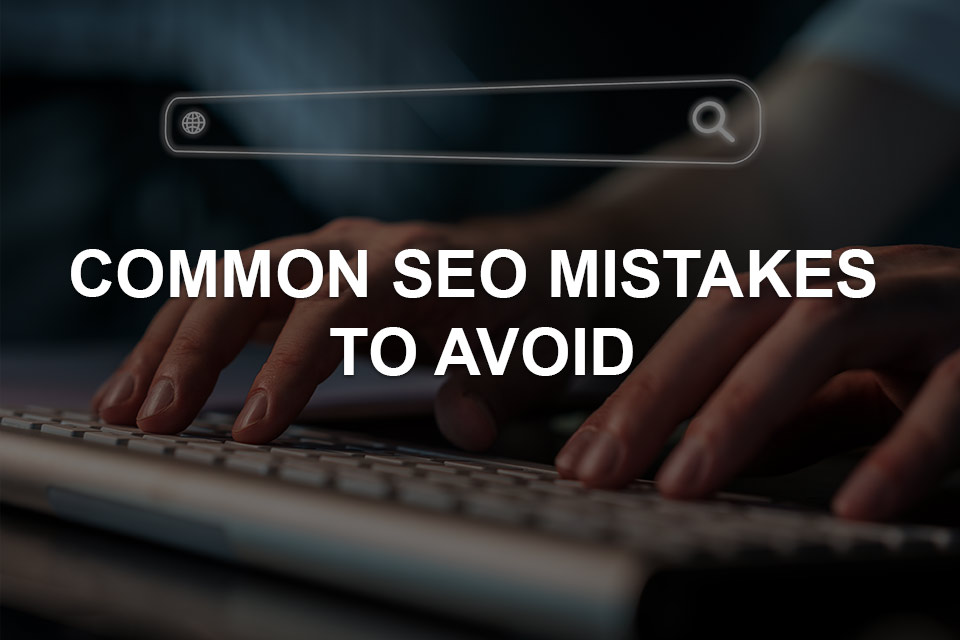What are the Most Common SEO Mistakes to Avoid?

SEO mistakes can significantly hinder your website’s performance and visibility in search engine rankings. In today’s digital environment, understanding and avoiding these common mistakes is crucial for successful online marketing. Whether you are an SEO expert or a beginner; this article will shed light on the common content SEO mistakes away.
Key SEO Mistakes That Hinder Website Performance
The most important enterprise SEO mistakes that can seriously hamper website performance are inadequate keyword research and targeting, neglecting on-page SEO, and being poor at backlinking. If you don’t have a solid understanding of the keywords your target audience is using, or if you have insufficient knowledge of other important aspects, you risk missing out on valuable organic traffic. So, what needs to be done SEO mistakes to avoid?
Inadequate Keyword Research and Targeting
One of the most important steps in avoiding the negative consequences of common SEO mistakes is to do thorough keyword discovery using keyword research tools like Search Console, Ahrefs, or SEMrush. You can start this work by identifying keywords related to having good search volume and moderate competition. Once you’ve created a list of target keywords, include them strategically included in the content of your website, including titles, page titles, meta description, and alt tags. By optimizing your website with the right keywords, you can rank higher in search engine results pages (SERP), avoiding content mistakes that harm SEO.
Neglecting On-Page Optimization
One of the other international SEO mistakes that can hamper website performance is neglecting on-page optimization. On-page factors play a crucial role in search engine rankings, so it’s essential to pay attention to them. Start by optimizing your page titles, meta descriptions, and URL structures to accurately reflect the content of each page while incorporating relevant keywords. Ensure your website has a clear and logical site structure, with properly organized headers (H1, H2, etc.) that use keywords where appropriate. Don’t forget to optimize images by adding descriptive alt tags that include relevant keywords.
Ignoring the Power Backlinks
Ignoring the power of backlinks is one of the other WordPress SEO mistakes many website owners make. A backlink is an external link from other websites that point to your site, and they are a significant ranking factor in search engine algorithms. However, not all backlinks are created equal. Quality is crucial here. Instead of focusing on acquiring a large number of low-quality backlinks, prioritize building high-quality, authoritative links from reputable websites in your industry. One effective method is to create valuable content that naturally attracts links from other websites. Guest blogging on relevant industry blogs and participating in online communities can also help you establish valuable backlinks.
Practical Tips to Enhance Your SEO Strategy
Want to improve your SEO strategy and increase your website’s visibility in search results? In this article, we’ll offer practical tips that can help you achieve just that. From conducting a thorough website audit to creating high-quality content and optimizing for mobile users, these actionable strategies will help you avoid top SEO mistakes.
Common SEO Mistakes to Avoid with a Compliant Website Audit
Perhaps the first thing you should do to improve your SEO strategy is to conduct a comprehensive website audit. This process involves evaluating various aspects of your website to identify areas for improvement. You can start by analyzing the structure and navigation of your website, but you should make sure that it is user-friendly and easy to navigate. Next, review your website’s on-page elements such as page titles, meta descriptions, and title tags to ensure they are optimized for relevant keywords. Evaluate the loading speed of your web pages and make any necessary optimizations to improve site performance. Also, check for broken links and ensure that all URLs of your website are search engine friendly. By performing a thorough website audit, it is possible to local SEO mistakes to avoid.
Create High-Quality and Engaging Content
High-quality and engaging content is the cornerstone of avoiding the most common SEO mistakes. Creating valuable content that resonates with your target audience not only improves user experience but also drives organic traffic and valuable backlinks. Start by understanding your audience’s needs and interests, and then develop content that provides relevant and informative information. Incorporate relevant keywords into your content in a natural way, but make sure that the content reads naturally and doesn’t seem forced. Consider using a variety of content formats such as blog posts, articles, infographics, videos, and podcasts to appeal to different user preferences. By focusing on creating high-quality content, you can make your website a valuable resource in your industry and improve your search engine rankings.
Optimize for Mobile Users
Optimizing your website for mobile users is another important aspect for avoid to seo mistakes in digital content production. Mobile optimization involves ensuring that your website is responsive and adapts seamlessly to different screen sizes. Accordingly, you should implement a responsive design that automatically adjusts the layout and content according to the user’s device. Mobile users have limited tolerance for slow-loading pages, so optimizing your website’s loading speed is extremely important. To improve the mobile user experience, you should use large and legible fonts, clear navigation menus, and easily clickable buttons. However, it is extremely important to optimize your content for mobile consumption by dividing it into smaller paragraphs, using subheadings, and adding multimedia elements.
In the world of SEO, avoiding mistakes webmasters make in SEO is extremely important to achieve success online. From poor keyword research to neglecting on-page optimization and underestimating the power of backlinks, every mistake can have a detrimental effect on your SEO efforts. Take advantage of effective SEO practices and stay one step ahead of the competition in the digital world by avoiding top SEO mistakes!
FAQ
What are the 3 most common mistakes that SEO managers do?
Three common SEO mistakes managers often make include neglecting proper keyword research, overlooking the importance of high-quality backlinks, and failing to regularly analyze and adapt their strategy. Neglecting keyword research leads to ineffective optimization efforts. Ignoring the importance of high-quality backlinks prevents the website from gaining visibility in search results. Failing to regularly analyze and adapt strategies results in missed opportunities to optimize performance and stay ahead of competitors in the ever-changing SEO landscape.
What is the biggest SEO challenge?
The biggest SEO challenge is maintaining the alignment between technical optimization and user experience. While search engines rely on technical elements such as website structure, meta tags, and site speed, user experience factors such as content relevance, usability, and mobile friendliness are equally important. Another major challenge is to stay current with search engine algorithm changes and adapt strategies accordingly to ensure long-term success. By addressing these challenges, SEO practitioners can maximize the visibility of websites, drive organic traffic, and provide a seamless user experience.
What is the most difficult part of SEO?
The most difficult part of SEO is striking the delicate balance between meeting search engine requirements and satisfying user intent. It involves understanding complex algorithms while also creating valuable and engaging content that resonates with the target audience. Furthermore, keeping up with the ever-changing SEO landscape, staying updated on industry trends, and adapting strategies accordingly add a layer of difficulty. Successfully navigating these challenges requires a comprehensive approach that combines technical optimization, content relevance, user experience, and continuous monitoring and adjustment.



0 Comments